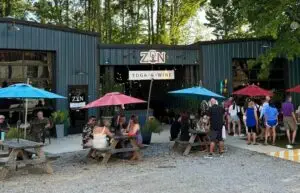Yarn is twisted in Hickory. Leather is sourced from High Point. Liners come from Burlington.
That’s part of the Cary-based Stitch Golf’s production line that snakes across the state in tracks left by a deflated furniture industry.
More than two years ago, Charlie Burgwyn packed a suitcase and went door to door, factory to factory, county to county. He was looking for a production line of products and services that would allow him and his partner to build a company around a sleek, leather golf club cover that was “Made in the US” with a price between $US29 and $US55.
Determined to find vendors within driving distance from Cary, Burgwyn stopped in nearby Hickory, High Point, Albemarle and Troy.
“Everywhere that they had some type of manufacturing of textiles,” he said.
The company shipped its first cover on November 21, 2011, to the Winged Foot Golf Club, 40km north of New York City. Since then, Stitch Golf has manufactured 200,000 club covers and brought in several millions of dollars in revenue, distributing to 1,200 private clubs and resorts across the country.
While the “shop local” message is emphasised by campaigns, some businesses and organisations take that to another level: local business-to-business sourcing.
Retailers might not be able to co-ordinate an entire manufacturing process, but it’s possible to incorporate some locally-made specialty items and turn to local businesses for services and items, said Jennifer Martin, executive director of Shop Local Raleigh, an arm of the Greater Raleigh (NC) Merchants Association.
Studies have shown that when consumers buy products and services from independent, locally-owned businesses instead of from big-box retailers, it helps strengthen the community’s economic base.
When small-business owners use local business-to-business providers and vendors, it brings the “shop local” practice full circle and makes that multiplier effect that much stronger, Martin said.
It may take owners more time to find the most appropriate service providers, but the advantages include working with professionals who are more vested in community business and who can offer personalised services and products.
Shop Local Raleigh has created a business-to-business service section to help small businesses find the services they need.
Becca Smith is the director of marketing for Smith & Smith CPA, a family-owned-and-operated business in Cary. She said local firms provide better customer service and have more knowledge about the area and its related laws and regulations. And, they can serve as a resource for referrals to other businesses.
“You don’t have to outsource it to somewhere else in the country. Put local first,” Smith said.
http://au.finance.yahoo.com/news/building-local-supply-chain-asset-030107297.html







